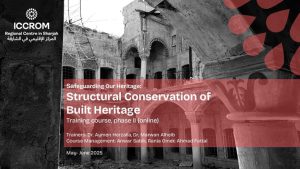SHARJAH / WAM
The International Centre for the Study of the Preservation and Restoration of Cultural Property (ICCROM), in collaboration with its regional centre in Sharjah, has completed the second phase of its online advanced training course titled “Structural Conservation of Built Heritage.”
The course attracted over 125 participants from 27 different countries, indicating a growing global interest in the topics offered. This high level of attendance also reflects the breadth of activities provided by the ICCROM Regional Centre in Sharjah as part of its training and capacity-building programme. The 11-day training course was designed to equip participants with the skills and knowledge to preserve the historical value of heritage structures while also enhancing their structural integrity. It focused on advanced skills in structural assessment and diagnostics, providing practical expertise in designing and implementing targeted structural interventions. These competencies were further strengthened through real-world case studies tackling complex conservation challenges, empowering participants to take a leading role in heritage conservation and drive meaningful impact in the field.
“The ICCROM Regional Centre in Sharjah is dedicated to enhancing the capabilities of individuals involved in cultural heritage, including restorers, managers, researchers, and students,” stated Mr Nasir Al Darmaki, Deputy Manager of the ICCROM Regional Centre in Sharjah.
“The Centre aims to improve their knowledge and skills in managing, preserving, and revitalizing cultural heritage, ultimately contributing to a better present and future for society. This mission aligns with ICCROM’s strategic directions and the vision of the Government of the Emirate of Sharjah for the Arab region.”
Architect Anwar Sabik, course manager and Programme Officer for Training and Field Projects at the ICCROM Regional Centre in Sharjah, stated: “The goal of organizing this remote training on structural conservation is to engage a wide range of beneficiaries, particularly in areas where structural conservation is most needed.”
These regions face natural and human challenges that threaten the safety of historic buildings.”
“We aim to present the concept of structural conservation along with its integrated methodology. This approach is supported by a variety of diverse and rich projects and case studies from reputable international experts who are dedicated to high quality and professional ethics. They adapt to the unique characteristics of each region’s heritage to enhance knowledge for Arabic speakers.”
 The Gulf Time Newspaper One of the finest business newspapers in the UAE brought to you by our professional writers and editors.
The Gulf Time Newspaper One of the finest business newspapers in the UAE brought to you by our professional writers and editors.
